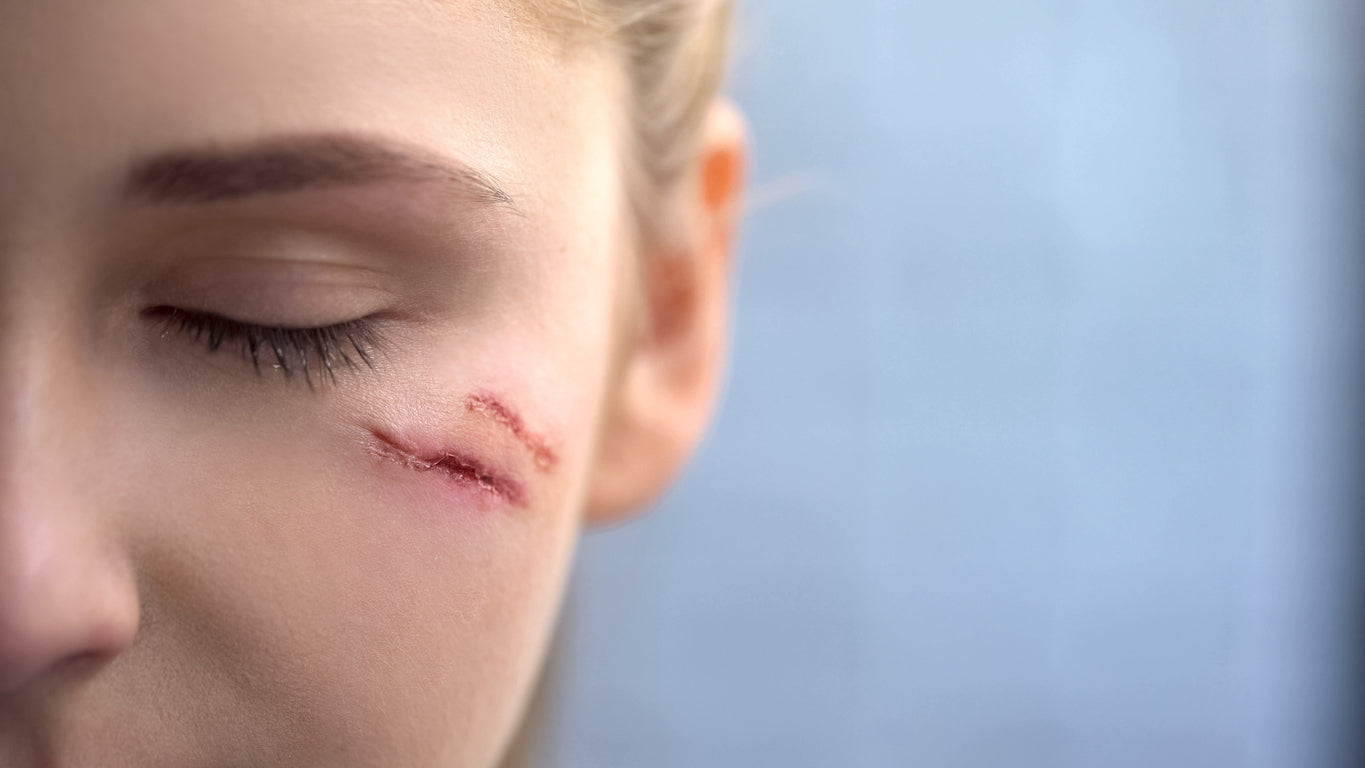How Long Does it Take For a Scar to Heal?

If you’re recovering from an injury or recent surgery, you’re probably wondering how long it will take for your scar to heal so you won’t have to see that constant reminder of your wound every day. So how long does it take for a scar to heal? Unfortunately, there is no straightforward answer to this question. The length of time it takes for a scar to heal depends on many things, including your age and overall health, your lifestyle habits, the location and depth of the wound, and many environmental factors that your scar may be exposed to during healing. To get a better idea of how long it takes for a scar to heal, keep reading below!
SCAR FORMATION: THE FINAL PHASE OF WOUND HEALING
Scars form as a result of the body’s natural wound healing process. This is a complex process which involves four highly integrated and overlapping phases: hemostasis, inflammation, proliferation, and tissue remodeling. Hemostasis simply means to stop the flow of blood, which you’ll see as a scab formed over the wound. Inflammation occurs as blood vessels dilate and immune cells gather to repair the wound, which appears as redness and swelling.
During proliferation, cells within the wound bed called fibroblasts rapidly produce collagen, glycosaminoglycans, and proteoglycans to synthesize the new extracellular matrix (ECM). Following robust proliferation and ECM synthesis, wound healing enters the final remodeling phase, which is when scar tissue is formed. Researchers have determined that the scar remains in this phase for at least one year, but sometimes can last for several years. According to the National Institutes of Health, it takes between two and three years for scars to turn pale and the skin to mature. However, even after this point, there are several things you can do to encourage the scar to heal even further for a less noticeable result.
FACTORS INFLUENCING A SCAR’S HEALING TIME
There are many different factors that can influence a scar’s healing time. Some of these you cannot control, such as your age and your skin type. Certain ethnicities are more prone to developing abnormal scars, such as keloids and hypertrophic scars. Plus, the skin becomes less resilient and less elastic as we age, which causes scars to heal more slowly. Even though you cannot control these factors, there are many things you can do to help your scar heal faster.
The first and most important thing you can do to help your scar heal as quickly as possible is to follow proper wound care. Keeping the area clean and covered will help to prevent an infection. Wound infections prolong scar healing because the microorganisms that have taken over the wound site compete with fibroblasts for nutrients and other resources. If the function of fibroblasts is impaired, the wound can become larger and have a harder time recovering. In addition to delaying healing, infections can worsen the scar’s final appearance.
Another factor that influences a scar’s healing time is your diet. In fact, nutrition has been recognized as a very important factor that affects wound healing for more than 100 years.
Carbohydrates, protein, fat, vitamins, and minerals can all affect the healing process. Carbohydrates are the primary source of energy in wound healing, with glucose being the fuel that helps new blood vessels and tissues form. Protein is another very important nutrient that can affect wound healing. A deficiency of protein can impair capillary formation, fibroblast proliferation, collagen synthesis, and wound remodeling. Additionally, collagen synthesis requires co-factors such as ferrous iron and vitamin C, and deficiencies in any of these co-factors can result in impaired wound healing. Therefore, eating a healthy, balanced diet with plenty of protein and healthy carbs and fats can help your scar to heal faster.
The length of time it takes for a scar to heal also depends on how much oxygen your scar receives during wound healing. You can increase the amount of oxygen that reaches your scar by exercising and avoiding smoking. Numerous studies have proven that smoking negatively affects wound healing. The nicotine in smoke interferes with oxygen supply by decreasing tissue blood flow via vasoconstrictive effects. Thus, in addition to many other health benefits, quitting smoking can help your scars heal faster.
USE PRODUCTS THAT PROMOTE SCAR HEALING
Besides understanding the different factors that can influence a scar’s healing time, you can further speed scar healing by using scar treatment products that promote healing. Avoid home remedies such as vitamin E and lemon juice, which can actually irritate a healing scar and cause it to take longer to heal. Additionally, avoid fragrances and preservatives, which can also be irritating and further delay healing. Instead, look for products that contain ingredients that have been proven to promote scar healing, such as silicone gel.
Clinical studies have shown that silicone gel and sheeting are considered the first-line therapy to manage and minimize scarring. In fact, they are the only topical treatments recommended by the scar experts who create scar treatment guidelines for other doctors. The use of topical silicone gel or silicone gel sheeting can protect the scarred tissue from bacterial invasion by providing an occlusive barrier. This barrier also helps to keep the affected area hydrated and provides a continuous light pressure that helps the scar to stay flat, soft, and less red.
We understand that it can be disheartening to learn that scars can take up to one year if not more to fully heal, which is why we’ve developed the NewGel+ products to help your scars heal better and faster. All NewGel+ products contain 100% medical grade silicone gel, which is proven to reduce, flatten, and fade your scar. Positive results can be seen in as little as 3 to 7 weeks! We believe that NewGel+ Advanced Silicone Gel products offer the best, most effective, non-invasive method to manage your scars and help them to heal faster.



Comments